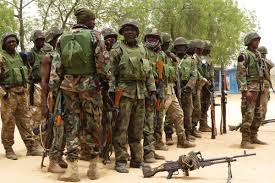The Defence Headquarters has said that media reports saying that Nigerian troops in Mali have been recalled to fight the Boko Haram insurgency in the country as “complete falsehood.”
This was made known by Director, Defence Information, Brigadier-General Chris Olukolade, in Abuja, on Tuesday, who assured that the Nigerian Army was capable and battle ready to take on the Boko Haram insurgents without recalling its troops from Mali.
About 1,000 troops were deployed in Mali between February and March, as part of the Africa- led International Special Mission in Mali (AFISMA) to bring peace to the country.
Olukolade said it was normal to rotate scheduled troops in various missions, which, he stressed, would continue and should not be misunderstood, saying that the times were too sensitive to engage in unnecessary speculations.
“As a matter of fact, the normal and scheduled rotation of troops in various missions will continue. This routine should not be misunderstood or misrepresented to misinform Nigerians and the international community.
“The report, therefore, in a section of the press that Nigerian troops are to be withdrawn from Mali to face the ongoing insurgency is complete falsehood,” he said.
The Defence spokesman noted that there was no need for such action now, as the human and material resources of the Armed Forces of Nigeria were being meticulously deployed to meet its present internal and external assignments.
Since the state of emergency declared by President Goodluck Jonathan in Borno, Yobe and Adamawa States on Saturday, there has been massive deployment of troops and military hardware to the states as the military steps up its offensive against the insurgents, backed with air raids.
Meanwhile, it has been revealed that some of the Boko Haram insurgents fighting the military in the North-East are actually Islamist insurgents armed with sophisticated weapons from Libya.
“They have been putting up fierce resistance and they are very, very well-armed with weapons from Libya,” a senior military official told The Guardian, United Kingdom (UK), adding that most of the militants who had waged a four-year battle to create an Islamist state had scattered across the region’s semi-desert borders.
A renewed military campaign, including aerial bombardments of Boko Haram training camps in three remote states which were put under emergency rule this month had led to the capture of almost 200 militants and the death of dozens in a week, according to the military.
In one raid, a helicopter gunship was hit by anti-aircraft and anti-tank fire, a military source said.
In a sign of increasing concerns about jihadist movements jumping borders, Nigeria had also asked neighbouring Niger Republic for military support, as it seeks to police 870 miles of shared desert borders, underlining moves towards West African cooperation against jihadists seen as a cross-border threat.
There have been growing concerns particularly after Islamist militants associated with al Qaeda seized the north of Mali last year and were dislodged only after French-led military intervention.
Nurudeen Muhammed, Minister of State for Foreign Affairs, delivered the request for help from President Goodluck Jonathan to his Nigerien counterpart, Mahamadou Issoufou, late on Monday, in Niamey.
“We currently have military operations underway in three states in Nigeria to combat terrorism and we would like to have Niger’s support in the common fight against these terrorists,” Muhammed told Niger State Television.
Military sources said Nigerian forces had faced stiff resistance by hardened Islamist rebels entrenched in the North and using cross-border routes to smuggle in weapons.
Nigeria and Niger Republic signed a bilateral defence pact in October 2012, that includes sharing intelligence on Islamist groups and joint military exercises. The deal stipulates that a request for military aid by one nation cannot be refused by the other.
The two West African nations share a porous frontier of more than 1,500 km (940 miles). The fighting in Nigeria has pushed more than a thousand refugees across the border into Niger in the past few weeks, according to United Nations (UN) estimates.
Soldiers from Niger and neighboring Chad participated with Nigerian forces in a joint assault on Boko Haram fighters last month in Baga, a fishing settlement on the shores of Lake Chad.



Leave a Reply